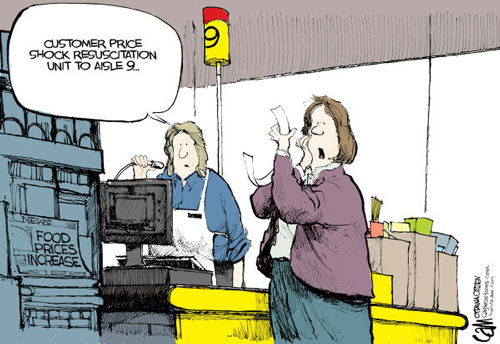
Our Money FactoryBy TOM PURCELL November 23, 2012
"Good morning, students," says Mr. Johnson. "Did you know that in Washington, D.C., and one other location in Fort Worth, Texas, the United States government operates one of the largest printing operations in the world? Every day, we print 38 million paper bills!" "Gee, Mr. Johnson, that is a lot of money," says a boy in the class. "But I thought the government makes most of the money electronically these days." "That is a very good point, young man. Way back in 1913, the U.S. government created a central bank called the Federal Reserve. Its goals are to encourage maximum employment, keep the dollar stable and keep interest rates in check."
Price Shock
"Well, young man, sometimes, when the economy is really bad — like it has been since 2008 — some people think it is a good idea to expand the money supply." "You mean create money out of thin air, Mr. Johnson!" "In America, the Federal Reserve is now in its third phase of 'quantitative easing.' It is what economists call an 'unconventional' monetary tool that allows a central bank to stimulate the economy." "I don't understand, Mr. Johnson." "Look, when the economy is bad, the Fed reduces short-term interest rates to encourage people to borrow more and stimulate activity. The Fed has the rates set at nearly zero now, but the economy still hasn't responded. The only option left is quantitative easing." "I still don't understand." "Here's how it works. The Fed creates money that didn't exist before and uses it to buy up assets from commercial banks, such as long-term Treasuries or mortgage-backed securities. This not only pumps money into the economy, but it causes long-term interest rates to fall further. That gives investors more incentive to spend and invest." "But is it working, Mr. Johnson? Over the past three years we have been doing this easing thing, economic growth has gotten slower each year." "Look, it is all very complex. Part of the problem is that much of the new money banks have to lend is not being loaned. That is probably because business owners are being selfish and refusing to borrow, invest and hire." "Well, maybe it is because it's so much harder to get loans, thanks to the Dodd-Frank financial reform bill. Besides, don't you mean business owners are too terrified to borrow, invest and hire? Every day, there are lots of new regulations they have to comply with. The costs of ObamaCare are causing them to lay off workers or use only part-timers. The deficit and rapidly growing debt are out of control, yet Americans just voted for more spending." "Well, aren't you a regular Chicken Little? Things are not so bad as you make them seem. There are very smart economists in the federal government who make these decisions for you." "Really, Mr. Johnson? There are lots of other smart people who worry that all this money creation will eventually cause real inflation when all those dollars sitting around start getting spent. Some think we already have inflation. Have you seen the price of food and gas lately?" "Now, now, young man, the Consumer Price Index shows that inflation is modest." "But the Consumer Price Index leaves food and gas out of its calculation! Look, Mr. Johnson, I am only a sixth-grader, but it is awfully frightening that our country's spending is so much more than our income." "Such a worrier you are." "Our government has $16 trillion in debt and the debt is growing a trillion a year. How are we going to pay the interest on the debt when rates eventually return to normal levels and our payments soar?" "It will all work out fine, young man." "And isn't all this funny-money stuff really showing that President Obama's big-government policies and spending are hurting the economy so bad that even near-zero interest rates and the creation of billions in new money can't jump-start it? What do you say to that, Mr. Johnson?" "I say we better create even more new money!"
©2012 Tom Purcell. Tom Purcell, a freelance writer is also a humor columnist for the Pittsburgh Tribune-Review, and is nationally syndicated exclusively by Cagle Cartoons newspaper syndicate. Distributed to subscribers
for publication by Publish A Letter in SitNews Read Letters/Opinions
|
||
